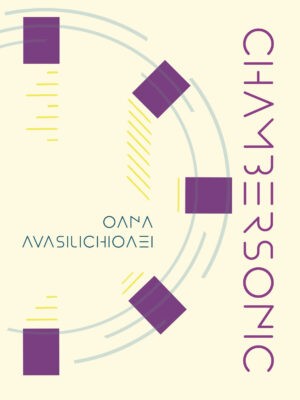The most dynamic pieces in Oana Avasilichioaei’s Chambersonic, a book made up of multiple, overlapping voices, take place on an imagined stage. In the section “Improbable Theatres,” the poet envisions a performance where people can choose between the role of performer or viewer. Each audience member decides beforehand how long they want to watch or perform the piece. A performer might plan to perform for twenty seconds, while a viewer expects to watch for twenty minutes. The only way for the show to end is for both parties to agree on an ending point. If not, they might spend the remaining nineteen minutes and forty seconds in studied silence.
Chambersonic Talonbooks 
Oana Avasilichioaei
$21.95
paper
159pp
9781772016260
Elsewhere, though, the book is loud. Voices overlap – literally, in QR codes through which the reader can access the associated musical compositions, or in a typeset that blurs entire lines together. The work relies on the metaphor of voice as an agent of political change, as in the section “Street Speak” which reproduces pictures of graffiti, and it takes its epigraph from the experimental composer Pauline Oliveiros: “Be subversive, very subversive.” Still, if subversion is everywhere, then it also risks being nowhere. One poem recalls the sound of “a supersonic blast / a market stall collapsing / [limbs] trapped under rubble / [the] constant din of rocket fire,” perhaps a reference to the experience of watching the genocide in Gaza unfold onscreen – a genocide made possible, in part, by the silence of Western media institutions. But maybe denouncing genocide and the institution’s complicity therein is less the work of poetry and more the work of its readers, or of anyone with a voice and the good fortune to broadcast it from a platform.mRb






0 Comments